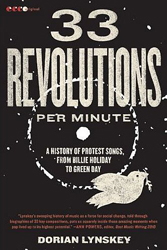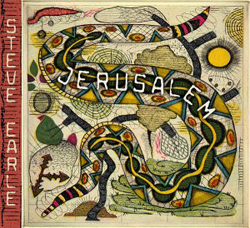STEVE EARLE

Book excerpt by Dorian Lynskey
(June 2011)
ED NOTE: The following is an abbreviated chapter from Dorian Lynskey's recent book, 33 Revolutions Per Minute- A History of Protest Songs, which covers everything from Billie Holliday to Bob Dylan to James Brown to Gil Scott-Heron to Public Enemy to Fela Kuti to the Clash to Green Day.
In the weeks before 11 September 2001, country-rock singer Steve Earle was thinking about putting together an album of protest songs. He already had one in the bag: "Amerika v 6.0 (The Best We Can Do)," an attack on the U.S. healthcare system he had written for the Nick Cassavetes movie, John Q. But when two hijacked jets brought down the World Trade Center and another crashed into the Pentagon, there was suddenly no room in America for dissent.
On September 14th, several media outlets reprinted an e-mail which had been circulated by the giant radio conglomerate Clear Channel; it listed over 150 'lyrically questionable' songs to be avoided by DJs, including "War," "Imagine," "Eve of Destruction" and the entire back catalogue of Rage Against the Machine. Clear Channel were quick to insist that it was merely for guidance, rather than an official blacklist, but in the feverish post-9/11 climate, self-censorship was such a powerful instinct that most DJ's obeyed the list anyway in the name of 'sensitivity.' Steve Earle soon found that Cassavetes was no longer returning his calls regarding "Amerika v 6.0"– apparently, even healthcare was no longer up for debate.
Predictably, Americans turned en masse to songs they could wear like armor. Lee Greenwood's flag-waving evergreen "God Bless the U.S.A." returned to the airwaves with a vengeance, while a Harris poll in late September found that 70 per cent of respondents had sung "God Bless America" at some point during the past weeks. What chance did a protest song have in such an environment? R.E.M.'s Michael Stipe referred to the period as 'the Great Quiet.' It was clear that whoever broke the silence would have hell to pay.
Earle was on tour in Europe in December 2001 when he first heard the name John Walker Lindh. Lindh was a twenty-year-old American who had first become interested in Islam via rappers such as Ice Cube and Public Enemy, and converted in 1997. He studied Arabic in Yemen, then continued his studies at a radical madrassa in Pakistan. In May 2001, he broke off contact with his family and moved to Afghanistan to join the fundamentalist Taliban regime in the fight against Northern Alliance rebels. After 9/11, the Taliban rejected a U.S. ultimatum to hand over all Al-Qaeda leaders and close terrorist training camps in the country, making a U.S. invasion of Afghanistan inevitable. As the Northern Alliance became U.S. allies, Lindh continued to fight for the Taliban. He was apprehended by the Alliance on November 25th, promptly escaping during a major Taliban uprising at the ad-hoc prison in which he was held but was recaptured on December 1st, which is when this stick-thin, cracked-lipped, dust-throated, virtually delirious figure was introduced to the rest of the world via an interview on CNN.
Earle was struck by the fact that Lindh was the same age as his own son, Justin. "I became acutely aware that what happened to him could have happened to my son, and your son, and anybody's son," he told the Guardian's John Harris. "Nobody in my country wanted to admit that. It's one of the most American stories I've ever heard: he came to Islam by way of hip-hop, which I find fascinating. He was already looking outside his culture, like a lot of American kids are."
Earle began writing a song from Lindh's perspective: 'just an American boy, raised on MTV.' Singing in a parched croak modelled on Lindh's voice in the CNN clip, the narrator of "John Walker's Blues" is an alienated teenager groping towards a cultural identity to call his own. In Afghanistan, he 'fight[s] for what he believes' and is taken back 'to the land of the infidel.' The chorus is a line from the Koran ('Asshadu an la illaha il Allah / There is no God but God') and the song closes with a sample of a Koranic prayer. Setting aside the politically loaded context, it's one of Earle's classic first-person character songs about an outlaw underdog, with Lindh a successor to the Death Row inmate in "Billy Austin" and the desperate Vietnam veteran of "Copperhead Road."
"It became increasingly obvious to me that John Walker was being set up as a warning to any American that got out of line while this war against the new bogeyman was being pursued," explained Earle. "I was trying to humanise him, because everybody else was trying to vilify him." In the jingoistic hothouse of America in 2002 however, this kind of empathy was a tough sell. When he told his friend Elvis Costello about planning to release the song, Costello replied that he was 'fucking crazy.'
Earle included the song on his next album, Jerusalem, where it sat alongside the reclaimed "Amerika v 6.0 (The Best We Can Do)." The disc was due for release in September 2002 but advance copies went out to critics two months early, which is when the storm broke. 'Twisted Ballad Honors the Tali-Rat,' barked the New York Post on July 21st, 2002. 'Do you think an American would have written a paean to Hitler during World War Two?' a commentator on CNN asked absurdly.
At the same time, country radio was hammering another Nashville song: the red-blooded war holler of Toby Keith's "Courtesy of the Red, White and Blue (The Angry American)." Keith left no patriotic stone unturned: 'Old Glory' flying proud, freedom's bell ringing out, a soaring eagle, a fist-shaking Statue of Liberty, Afghanistan 'lit up like the 4th of July' and so on, like a pick-up truck plastered with bumper-stickers. "That record embarrasses me," complained Earle. "It's pandering to an audience. But doing that in this atmosphere is dangerous. I have a fear that someone with dark skin and clothing different to what people wear in Tennessee might get hurt because of that song. It scares me." While Keith's song was flying high, Earle wrote in the sleevenotes to Jerusalem: "Lately, I feel like the loneliest man in America."
